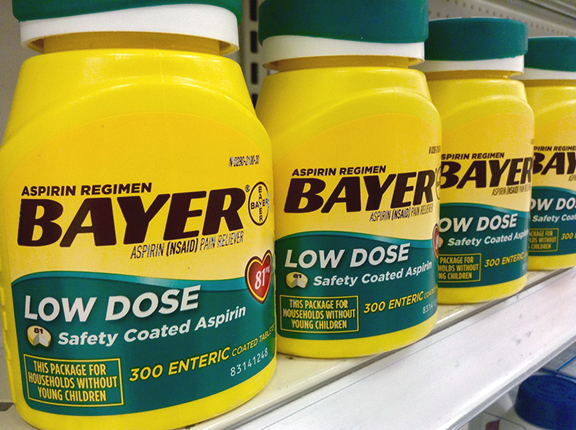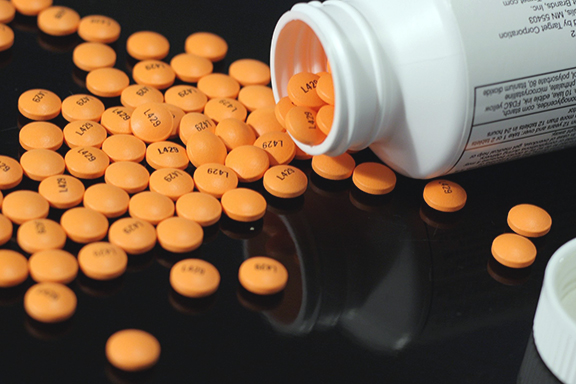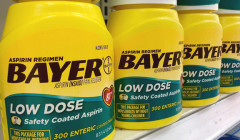Asprin … To Take or Not To Take
Today I take on aspirin. Why not? I have already talked about the overuse of statin drugs, the crazy dietary recommendations including salt restriction, the beneficial role of fat in your diet, and supplements so why not take on aspirin. Seems like everyone in America is taking an aspirin or knows someone taking aspirin. It’s almost expected on people’s records that if they are adults you just mark multivitamin and aspirin as presupposed medicines. I think most doctors just assume adults are taking a multivitamin and an aspirin … on general principle. But what’s the science behind it? I was going to write that there is no evidence that aspirin is beneficial for most people. That would be wrong. There is evidence that aspirin is beneficial … but there is also evidence that most people don’t need it and actual can be hardened by it. You shouldn’t just drink the aspirin-aide … you should decide for yourself and should base it on the evidence.
It’s almost expected on people’s records that if they are adults you just mark multivitamin and aspirin as presupposed medicines. I think most doctors just assume adults are taking a multivitamin and an aspirin … on general principle. But what’s the science behind it? I was going to write that there is no evidence that aspirin is beneficial for most people. That would be wrong. There is evidence that aspirin is beneficial … but there is also evidence that most people don’t need it and actual can be hardened by it. You shouldn’t just drink the aspirin-aide … you should decide for yourself and should base it on the evidence.
If you ask your doctor if you should take an aspirin he or she will probably say … ”sure why not?” This is the conventional wisdom. The current thought is to take a low dose aspirin product because you get all the benefit with the least risk. Sounds great. Sounds prudent. But what does the evidence say? What are the guidelines? That’s what I will focus on here. If you mention to your provider that Dr Barry questioned the universal use of recommending aspirin they will respond … ”Dr Barry is off his meds !” So instead clip out this article and bring it with you and ask them to refute the expert testimony herein!
Let’s start with the recommendations from one of the most prestigious organizations: the United States Preventive Services Task Force. “The USPSTF recommends initiating low-dose aspirin use for the primary prevention of cardiovascular disease (CVD) and colorectal cancer (CRC) in adults aged 50 to 59 years who have a 10% or greater 10-year CVD risk, are not at increased risk for bleeding, have a life expectancy of at least 10 years, and are willing to take low-dose aspirin daily for at least 10 years.”
Furthermore “The current evidence is insufficient to assess the balance of benefits and harms of initiating aspirin use for the primary prevention of CVD and  CRC in adults younger than 50 year or older than 70 years.“ So yes I am saying that one of most prominent organizations say that aspirin only has really good evidence in people between 50 and 60! There are bleeding risks associated with aspirin. I am not worried about the increased risk of GI bleeding with the drug … I figure that is offset by the possible benefit of decreasing colon cancer. The bleeding risk I worry about is in the brain. If you take aspirin and have a fall with head injury aspirin can increase the amount of bleeding around the brain. If you have a bleeding type of stroke, which thankfully accounts for only a small percentage of strokes, having been on aspirin increases the bleeding in the stroke area. This is not good. I can transfuse blood but I can’t transfuse brain. At least not yet.
CRC in adults younger than 50 year or older than 70 years.“ So yes I am saying that one of most prominent organizations say that aspirin only has really good evidence in people between 50 and 60! There are bleeding risks associated with aspirin. I am not worried about the increased risk of GI bleeding with the drug … I figure that is offset by the possible benefit of decreasing colon cancer. The bleeding risk I worry about is in the brain. If you take aspirin and have a fall with head injury aspirin can increase the amount of bleeding around the brain. If you have a bleeding type of stroke, which thankfully accounts for only a small percentage of strokes, having been on aspirin increases the bleeding in the stroke area. This is not good. I can transfuse blood but I can’t transfuse brain. At least not yet.
Ok so this is just one panel … what do the other experts say … surely the American Heart Association and the American DIabetes Association weigh in on the use of aspirin. In the September 2015 edition of the American College of Cardiology commenting on the American Heart Association and the American Diabetes Association joint statement which state that “low-dose aspirin (75-162 mg/d) is reasonable for those at 10-year CVD risk of at least 10% without increased risk of bleeding (ACC/AHA Class IIa, LOE B, ADA LOE C) and in those with diabetes at intermediate risk defined as 5-10% 10-year CVD risk (ACC/AHA Class IIb, LOE C, ADA LOE Expert Opinion).”
A careful reading of the above will show that only in the sub population of people that have a 10 year risk of heart event of 10% does aspirin show any proven benefit. Translation = most people don’t need aspirin! Even the American Heart Association website specifically states “You should not start aspirin therapy on your own.” How often have you and your doctor calculated your particular 10 year heart and stroke risk score? After all, heart disease is the number one killer of adults in America … isn’t it worth 5 minutes of your time and your doctors time to calculate your risk or at least have a conversation about your risk factors? The calculators are available on the web and if you have access to your labs you can do your own calculation. These calculators have their detractors but they at least set the stage for the important conversation about your heart health and therefore your overall health. Dont be a passive observer of your health care experience … bring questions … expect at least conversation and education if not definitive answers about your health. Your doctor can only guide you … only you can improve your health and thats a great thing. You dont need a good insurance company. Its nice to have but it doesnt ensure your health. You dont need a gym membership. Its nice to have but it doesnt mean you can’t take care of your exercise business anywhere. You are the one who has to put down the cigarette and say “I’m done.” You are the one that has to look at your dinner plate and say “My new lifestyle starts today.” Does that empower you or scare you. Just because its up to you doesnt mean that you cant get help in lots of different ways to improve your health. Build your team. Work your team. Hopefully your medical provider is part of that team.
Until next month … get well and stay well.












